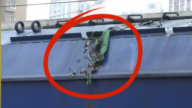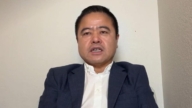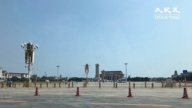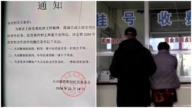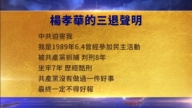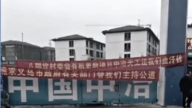【新唐人2013年07月17日讯】全球知名制药企业“葛兰素史克”在大陆涉嫌行贿案持续延烧,而中国医药领域中的“黑金”问题,也再次浮出台面。中国的药品从生产到患者手中,需要经过药厂、经销商、政府、医院、患者等五个环节,如果每个环节在价钱上都往上添一笔,那么可以想像,最后买单的患者,得花多少血汗钱。
“葛兰素史克中国投资有限公司(GSK)”,四名高管因涉嫌严重经济犯罪,被警方以涉嫌“商业贿赂和涉税犯罪”采取刑事强制措施。15号晚间,“葛兰素”英国总公司在官网发表致歉声明,表示羞愧与道歉。
“葛兰素史克”中国分公司副总裁梁宏等四名高级主管,涉嫌透过虚报会务费,一方面从承办旅行社收取回扣,另一方面,以浮报的金额行贿大陆医院及官员,让药品进入医疗体系。这些钱有的以现金直接回扣给高管,有的则继续留在旅行社账面上“备用”。
“葛兰素史克”在中国最大的收入来源就是药品销售,医药商业贿赂目标是政府官员、医院、医生,还有一些基金会,这些行贿成本几乎都转嫁到药价上。一颗原本30元的药,到患者手上可能暴增为300元。
中国卫生法学会理事、中国东南大学法学院教授张赞宁:“外国的药商厂商,他想打入中国的医药市场,不贿赂中国官员那是根本打不进去的,而且中国官方的操作往往是暗箱操作,是不公开的,他是不属于医院的,不受监督的。”
中国卫生法学会理事张赞宁,本身也是“东南大学法学院”教授,他说这个问题从侧面反映出中国制度性腐败的现状。
张赞宁:“因为医疗行业的商业贿赂,那个医生往往都是被动的接受,而不是主动的去索取,但是官方的那种商业贿赂,一般是有权力在后面起作用,如果你不贿赂他,你就根本办不成任何事情,这是有本质区别。”
中国大陆从上世纪90年代至今,已发生多起国际性跨国商业机构在华涉嫌商业贿赂事件。
例如﹕“美国辉瑞制药公司”去年8月受到美国证交会的处罚,就是因为公司向中国的医药部门及公职人员行贿。再有“西门子医疗集团”于2003年至2007年间,曾向5家中国医院支付了超过千万美元的贿赂脏款。其他还有摩根士丹利、IBM、朗讯、沃尔玛、德普、艾利•丹尼森等都曾在华涉嫌商业贿赂。
在中国,药品价格包括成本价、出厂价、批发价、招标价、政府指导价、医院采购价、零售价七个环节,每个环节的药品定价都不公开。
根据资深医药代表介绍,患者支付药品价格是出厂价的8倍,以治疗肝病的一种针剂为例,出厂价大约5至6元,全国总代理的价格为7至8元,省级代理价格为8至9元。官方认定的中标价格为36元,药价基本围绕中标价波动。省级代理卖给医药公司的价格为32元至33元,也就是中标价的90%至94%。医药公司卖给医院的价格为36元,医院再加价到42元,比中标价提高了15%左右卖到病人手里。
中国药价虚高的根本来源是公立垄断和“以药养医”。
“葛兰素史克”中国副总裁兼企业运营总经理梁宏透露,“葛兰素史克”运营费用在药价中占的比重有20%—30%,一种药品要上市,必须与各个部门打交道,注册涉及药监,价格涉及发改委,进医保涉及人力资源和社会保障,进地方涉及地方招标办,进医院涉及医院院长、科室主任、医生等等,如果涉及药品的环节少了,腐败也就少了。从根本上讲,“医药不分、以药养医”才是最大的问题。
采访/张天宇 编辑/黄亿美 后制/郭敬
Inside Story: Medicine and Drugs in China
A leading global pharmaceutical company GlaxoSmithKline
(GSK) has allegedly been involved in bribery inside China.
The issue of black gold has again been
exposed in the field of China’s medicine.
Medicine in China, from production to the counter,
goes through pharmaceutical companies, distributors,
government facilities, hospitals, and then to the patients.
The price increases at each link,
so costs for medicine are high.
GSK China Investment Co., Ltd. has four executives
on suspicion of serious economic crimes.
Police have taken compulsory measures, under charges
of suspicion of commercial bribery and tax-related crimes.
The British headquarters for GSK published an apology
statement on it’s official website on the evening of July 15.
It expressed shame.
Vice President Liang Hong, of GSK China Branch,
and other senior executives are alleged
to have reported false registration fees.
They took rebates from travel agencies, and also bribed
hospitals and government officials to allow their
pharmaceutical products into the health care system.
Some of the money was directly
rebated to executives in cash.
The rest remained on the books
in the travel agency, as a standby.
GSK’s largest source of income in China is drug sales.
Pharmaceutical industries target government officials,
hospitals, doctors, and some foundations with bribes.
Almost all of the cost of these bribes
is hidden in the price of drugs.
A pill originally costing 30 Yuan to produce,
may be raised to a cost of 300 Yuan for patients.
Zhang Zanning, Director of China Health Law Society,
and Law School professor in Southeast University:
“Foreign drug dealers and manufacturers could not get into
the Chinese pharmaceutical market without bribing officials.
The official operation often is in a black-box, so it
does not belong to the hospital, and is unsupervised."
Zhang Zanning said it reflected China’s
status quo on institutional corruption.
Zhang Zanning: “Because of commercial bribery
in the medical industry, the doctor often accepts
it passively, rather than actively requires it.
Bribery with officials is generally a manipulation of power.
If you do not bribe him, you can’t accomplish
anything, so it is essentially different."
From the 1990s until now, there have been many incidents
where international business organizations in China
have been involved in incidents of commercial bribery.
For example, U.S. based Pfizer pharmaceutical
company was punished by U.S. SEC in August 2012.
It was involved in bribing Chinese
authorities, as well as public officials.
Siemens Medical Group had bribed five hospitals in China,
between 2003 and 2007, with tens of millions of US dollars.
In addition, Morgan Stanley, IBM, Lucent, Wal-Mart, Depp,
Avery Dennison have alleged commercial bribery in China.
In China, drug price includes the costs, factory prices,
wholesale prices, the tender prices, government guidance,
hospitals purchase prices and finally the retail prices.
In the seven stages, drug pricing
in each is not publicly available.
According to a senior medical representatives, drug
prices paid by patients are 8 times the factory price.
For example, for an injection to treat liver
disease, the factory price is about 5-6 Yuan.
The national distributor price is 7-8 Yuan,
the provincial agency price is 8-9 Yuan.
The officially recognized bid price is 36 Yuan, and
drug prices basically fluctuate around the basic price.
Provincial agencies sell it to pharmaceutical companies
at 32 to 33 Yuan, which is 90-94% of the bid price.
Pharmaceutical companies sell it to the hospital
at a price of 36 Yuan, and the hospital then sells
at 42 Yuan to patients, 15% higher than bid price.
The basic reason for high drug prices is that public
monopolies and drugs sales are used to support hospitals.
Liang Hong, GSK Vice President and general manager
of business operations said, GSK operating expenses
accounted for a proportion of 20% -30% of the drug price.
To put a drug to market, they must
deal with various departments.
Drug registration involves Drug Administration, so the
price involves the Development and Reform Commission.
Health insurance involves human
resources, as well as social security.
Local markets involve local tender offices,
and to enter hospitals involves the hospital
director, department director, and doctors.
If links in the chain of drug production
were fewer, corruption will decrease.
Fundamentally, drugs and medicine are mixed together,
Doctors are dependent on drug
sales, which is the biggest problem.



